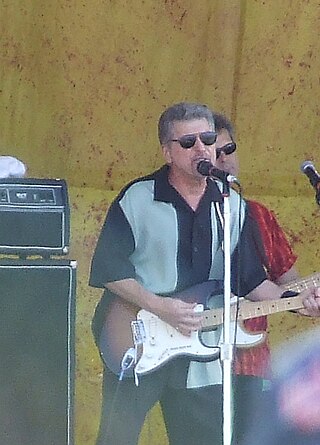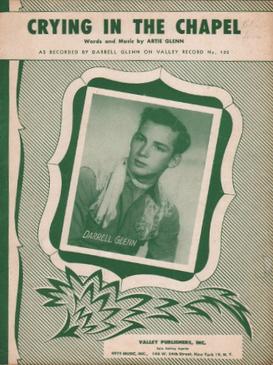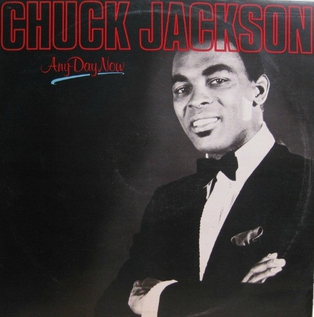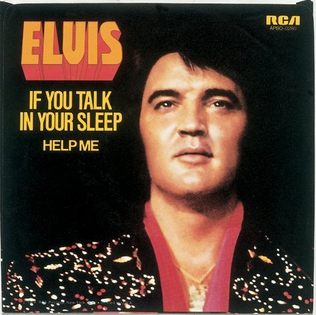
Johnny Rivers is a retired American musician. He achieved commercial success and popularity throughout the 1960s and 1970s as a singer and guitarist, characterized as a versatile and influential artist. Rivers is best known for his 1960s output, having popularized the mid-60s discotheque scene through his live rock and roll recordings at Los Angeles' Whiskey a Go Go nightclub, and later shifting to a more orchestral, soul-oriented sound during the latter half of the decade. These developments were reflected by his most notable string of hit singles between 1964 and 1968, many of them covers. They include "Memphis", "Mountain of Love", "The Seventh Son", "Secret Agent Man", "Poor Side of Town", "Baby I Need Your Lovin'", and "Summer Rain". Ultimately, Rivers landed 9 top ten hits and 17 top forty hits on US charts from 1964 to 1977.

"Burning Love" is a 1972 song by Elvis Presley, written by Dennis Linde, originally released by Arthur Alexander earlier in 1972. Presley found major success with the song, it becoming his final Top 10 hit in the American Hot 100 or pop charts, peaking at number 2.

"(Get Your Kicks on) Route 66" is a popular rhythm and blues song, composed in 1946 by American songwriter Bobby Troup. The lyrics relate a westward roadtrip on U.S. Route 66, a highway which traversed the western two-thirds of the U.S. from Chicago, Illinois, to Los Angeles, California. The song became a standard, with several renditions appearing on the record charts.
"Pledging My Love" is a blues ballad. It was written by Ferdinand Washington and Don Robey and published in 1954.

"Are You Lonesome Tonight?" is a song written by Roy Turk and Lou Handman in 1926. It was recorded several times in 1927—first by Charles Hart, with successful versions by Vaughn De Leath, Henry Burr, and the duet of Jerry Macy and John Ryan. In 1950, the Blue Barron Orchestra version reached the top twenty on the Billboard's Pop Singles chart.

"Crying in the Chapel" is a song written by Artie Glenn and recorded by his son Darrell Glenn. The song was released in 1953 and reached number six on the Billboard chart.

"Wooden Heart" is a pop song recorded by Elvis Presley. The composition is based on a German folk song "Muss i denn" and it was featured in the 1960 Elvis Presley film G.I. Blues. The song was a hit single for Presley in the UK Singles Chart, reaching No. 1 for six weeks in March and April 1961.
"School Days" is a rock-and-roll song written and recorded by Chuck Berry and released by Chess Records as a single in March 1957 and on the LP After School Session two months later. It is one of his best-known songs and is often considered a rock-and-roll anthem.

"I Forgot to Remember to Forget" is a 1955 rockabilly and country song, first recorded by Elvis Presley and written by Stan Kesler and Charlie Feathers. It was Elvis' first no. 1 record nationally. The single was the fifth and final single released on Sun Records before Elvis moved to RCA Records.

"Steamroller Blues", is a blues parody written by James Taylor, that appeared on his 1970 album Sweet Baby James. It was intended to mock the inauthentic blues bands of the day. The song later appeared on two of Taylor's compilation albums and has been recorded by a variety of other artists.
"Too Much Monkey Business" is a song written and recorded by Chuck Berry, released by Chess Records in September 1956 as his fifth single. It was also released as the third track on his first solo LP, After School Session, in May 1957; and as an EP. The single reached number four on Billboard magazine's Most Played R&B In Juke Boxes chart, number 11 on the Most Played R&B by Jockeys chart and number seven on the R&B Top Sellers in Stores chart in the fall of 1956.
"Brown Eyed Handsome Man" is a rock and roll song written and recorded by Chuck Berry, originally released by Chess Records in September 1956 as the B-side of "Too Much Monkey Business." It was also included on Berry's 1957 debut album, After School Session. The song title was also used as the title of a biography of Berry.

"(You're the) Devil in Disguise" is a 1963 single by Elvis Presley. It was written by Bill Giant, Bernie Baum, and Florence Kaye and was published by Elvis Presley Music in June 1963. The song peaked at No. 3 in the US on the Billboard singles chart on August 10, 1963, and No. 9 on the Billboard Rhythm and Blues chart, becoming his final top ten single on either chart. The single was certified gold by the RIAA for sales in excess of 500,000 units in the US. The song also topped Japan's Utamatic record chart in the fall of 1963.
"(You're So Square) Baby I Don't Care" is a 1957 song recorded by Elvis Presley and performed in the MGM film Jailhouse Rock. It was written by Jerry Leiber and Mike Stoller for the film. Presley plays electric bass on the song.

"Any Day Now" is a popular song written by Burt Bacharach and Bob Hilliard in 1962. It has been recorded by numerous artists over the years, including notable versions by Chuck Jackson in 1962, Alan Price in 1965, Elvis Presley in 1969, Scott Walker in 1973 and Ronnie Milsap in 1982. In the lyrics, the singer predicts the imminent demise of a romantic relationship and describes the sadness this will leave.
"Funny How Time Slips Away" is a song written by Willie Nelson and first recorded by country singer Billy Walker. Walker's version was issued as a single by Columbia Records in June 1961 and peaked at number 23 on the Hot C&W Sides chart. The song has been featured in several live action films and television shows, such as in the first episode of the second season of AMC’s Better Call Saul and in the 2020 Netflix drama The Devil All the Time.
"I Love You Because" is a song written and recorded by country music singer-songwriter Leon Payne in 1949. The song has been covered by several artists throughout the years, including hit cover versions by Al Martino in 1963 and Jim Reeves in 1964.
"I Washed My Hands in Muddy Water" is a song written by Joe Babcock.

The singles discography of Elvis Presley began in 1954 with the release of his first commercial single, "That's All Right". Following his regional success with Sun Records, Presley was signed to RCA Victor on November 20, 1955. Presley's first single with RCA, "Heartbreak Hotel", was a worldwide hit, reaching the No. 1 position in four countries and the top 10 in many other countries. Other hit singles from the 1950s include "Don't Be Cruel", "Hound Dog", "Love Me Tender", "Too Much", "All Shook Up", "(Let Me Be Your) Teddy Bear", "Jailhouse Rock", "Don't", "Hard Headed Woman" and "A Big Hunk o' Love". On March 24, 1958, Presley entered the United States Army at Memphis, Tennessee, and was stationed in Germany. He left active duty on March 5, 1960.

"If You Talk in Your Sleep" is a 1974 Elvis Presley song released as a single and featured on Elvis Presley's 1975 album Promised Land. The song was written by Red West and Johnny Christopher, who had earlier written "Mama Liked the Roses" and "Always On My Mind", both recorded by Elvis Presley.














